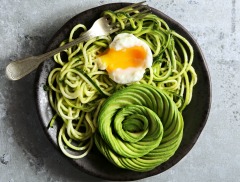Don't just meal plan... meal plan intelligently - with Meal Genius! Sign up for our free newsletter to get delicious recipes, sample meal plans and a whole lot more!
Shellfish, Oysters
Oysters are shellfish that fall into the mollusk category, which also includes clams, mussels and scallops.
Eastern oysters which are named for their origin-including Bluepoints, Chincoteagues and Lynnhavens-provide most of the oysters in the United States.
Oysters are an excellent source of iron, zinc, selenium, vitamin B12 and vitamin D.
Because oysters are filter feeders, their level of contamination will depend on the waters where they were cultivated. Oysters are considered an "Eco Best" by Oceans Alive.
Consuming raw or undercooked oysters can cause serious illness including infection with vibrio bacteria or hepatitis virus.
The Benefits
- Special diets: Autoimmune Paleo Diet, Gluten-Free Diet, Gluten-Free/Dairy-Free Diet, Grain-Free Diet, High Protein Diet, Low FODMAP Diet, Low Oxalate Diet, Low Starch Diet, Paleo Diet (Light), Paleo Diet (Strict), Pescetarian Diet, Primal Diet, Whole Food
- Excellent Source of: Iron, Selenium, Zinc, VitaminB12, Copper, EPA DHA Omega-3, Manganese
- Good Source of: Protein, VitaminC, Riboflavin, Phosphorous
- Preferences: No Fish, No Red Meat, No Pork, No Eggs, No Gluten, No Nuts, No Seeds, No Soy, No Dairy, No Poultry, No Molds, No Citrus, No Coconut, No Pseudograins, No Corn, No Yeast, No Peanuts, No Nightshade, No Legumes, No Grains, Low Carbohydrate, Low Fat, Low Sodium, Low Sugars, Low Saturated Fat
Related Foods
Selecting and Storing
Choose only oysters with tightly closed shells or those that snap shut when tapped. Smaller oysters are younger and more tender. Live oysters can be covered and refrigerated for up to 3 days. Shucked oysters will keep refrigerated in their liquid for 2 days.









